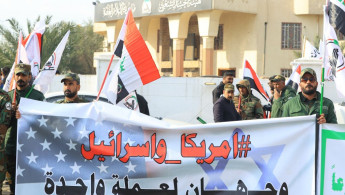Iraqi militias claim to have targeted Haifa Airport in Israel with suicide drones
After a nearly month-long ceasefire, Iraqi militias aligned with Iran have asserted responsibility for launching a kamikaze drone attack toward Israel's Haifa Airport on Tuesday night, reportedly causing significant damage. Meanwhile, Iraq's Prime Minister, Mohammed Shia al-Sudani, called for militias to either disarm or integrate into the country's official security forces.
After the start of Israel's war on Gaza, Iran-backed militias in Iraq under the name of Iraq's Islamic Resistance have conducted hundreds of attacks on US forces in both Iraq and Syria over Washington's unwavering support for Tel Aviv in its brutal onslaught on the besieged enclave.
But since early February, there have been a few reported attacks by the group on Israeli targets and US forces in Iraq and Syria.
"Within the second phase of operations against the occupation, and in solidarity with our brothers and sisters in Gaza, and response to the massacres by the Zionism against defenceless Palestinian civilians, mujahideen of Iraq's Islamic Resistance on Tuesday evening targeted a powerplant at Haifa airport in our occupies territories. We remain committed to dismantling enemy strongholds," the group said in a statement widely shared on social media platforms.
The attack has reportedly caused a huge fire to the powerplant, pro-Iran outlets and social media users claimed. However, Israel has not confirmed the attack.
The group has previously claimed responsibility for drone and ballistic missile attacks on Israeli targets. The group has claimed responsibility for "a drone attack at an Israeli military target in Golan on 12 February, in retaliation for Israel's massacres in Gaza," vowing it would continue attacks on "the hideouts of the enemy."
Israeli military commanders have previously threatened to retaliate against any attacks coming from Iraq, despite Tel Aviv saying it does not want to widen its war on Gaza to a regional war.
Relatedly, Iraq's PM Mohammed Shia al-Sudani said on 4 March while on the Saudi Arabian al-Hadath television channel that after the coalition forces leave Iraq, all the armed factions will have to surrender their weapons or integrate into state institutions.
Sudani is under increasing pressure from the militias to expel all forces from the international coalition against ISIS from Iraq. The Iraqi government has made several rounds of talks engaging in negotiations with the US to agree on the future of American and other foreign troops in the country. Baghdad expects discussions to lead to a timeline for reducing their presence.
Over the last 24 Hours, the Islamic Resistance in Iraq has claimed to have launched One-Way “Suicide” Drones against both Haifa Airport and Kiryat Shmona Airport in Northern Israel causing Damage; however, these claims by the Group appear to once again be False considering there… pic.twitter.com/waXeql2riT
— OSINTdefender (@sentdefender) March 6, 2024
Iraqi political observers say Sudani's latest statements on the militias aim to serve his future political image as he prepares to create his electoral list for the upcoming parliamentary elections.
Washington has some 900 troops in Syria and 2,500 in Iraq as part of an international coalition against the Islamic State group.
The US troops are based in Iraq upon a request from the Iraqi government to assist and advise the Iraqi security forces to combat the IS insurgency.
Three US service members were killed and many wounded on 28 January during an unmanned aerial drone attack on American forces stationed in northeastern Jordan near the Syrian border. Iran-backed groups were blamed for the attack.
The US military launched retaliatory airstrikes against Iranian forces and Tehran-backed militia groups in both Iraq and Syria, killing Abu Baqir al-Saadi, a top commander from the Iran-backed Kataib Hezbollah, in eastern Baghdad on 8 February.





 Follow the Middle East's top stories in English at The New Arab on Google News
Follow the Middle East's top stories in English at The New Arab on Google News


